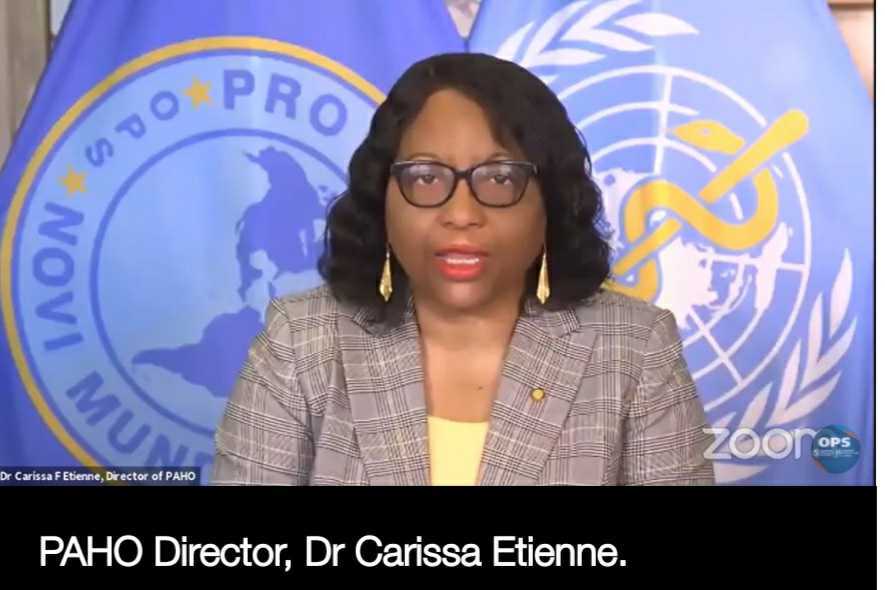| Washington D.C., Dec. 9, 2020 (PAHO) – The Americas has been experiencing “the highest levels of COVID-19 cases since the start of the pandemic” and health authorities should issue clear guidance to protect communities and act to boost hospital capacity in affected areas, the Director of the Pan American Health Organization Dr. Carissa Etienne warned today.
With more than 753,000 deaths and over 28.5 million cases reported in the Americas, “figures and trends make it clear that our region must redouble preventive measures, especially in preparation for the year-end holidays. Now is not the time to relax,” she told a press briefing.
In some countries, “We’re once again in need of coordinated efforts to boost hospital capacity in the most affected areas because when hospitals can’t accommodate everyone who is sick, many will die waiting for care,” Etienne said.
North America’s continued rise in infections as winter arrives is worrisome, because “people may be tempted to gather indoors in poorly ventilated areas – the perfect conditions for the virus to spread,” Etienne continued. In Central America, Honduras and Guatemala are seeing increases in the areas that were impacted by recent hurricanes, while Panama continues to report a high incidence of cases, she said.
South America’s situation is also of concern, Etienne said. “With cases and deaths mounting, Brazil’s health system is under strain and hospitals are at capacity in some areas. We’re also seeing rises in cases and deaths in areas of Colombia bordering Venezuela and Ecuador,” while Paraguay is facing a surge in infections.
“We’re hopeful that the COVID-19 vaccines, which will soon come to market, will help contain the pandemic, but this will take time and advance planning,” the PAHO Director said in an update on vaccine preparations. “At first, we won’t have enough doses to protect everyone, so the objective is to save lives using the first deployment to reach those most vulnerable to develop severe forms of COVID-19. That’s why PAHO has also been supporting Member States in developing their national immunization plans.”
PAHO is holding a meeting of its Directing Council this week to discuss preparations for vaccine introductions and purchases of vaccines through the PAHO Revolving Fund and the COVAX facility, Etienne noted. Countries in the Americas have secured more than $1 billion in down payments and financial guarantees to participate in COVAX, she said.
When vaccines arrive, she said, “Each country must identify priority groups and adapt communications campaigns and materials to meet their needs, including by working alongside community leaders to empower communities to seek vaccination. Health care workers will likely be among the first to benefit from a vaccine and will also play a key role in raising awareness about the importance of immunization.”
PAHO aims to help the countries ensure access to safe and effective COVID-19 vaccines under the principles of solidarity, equity and leaving no one behind that have guided PAHO’s response to this pandemic from the start, Etienne said. She noted that Universal Health Coverage Day, observed every December 12, “takes renewed importance during this year of pandemic. This day serves as a reminder that universal health is not just about ensuring everyone is covered, but that everyone has access to care when they need it, wherever they are.”
“That’s why PAHO has sent more than 20 million COVID-19 PCR tests to give countries better visibility into how the virus is spreading and to help identify those who are infected, so they receive the care they need. Many donors have supported us in this effort, and we want to thank them,” she noted. PAHO has also donated some 36 million masks, 3 million gloves, and 1.5 million gowns to countries so they can protect health workers and has led over 200 training sessions for health practitioners in the region. |

